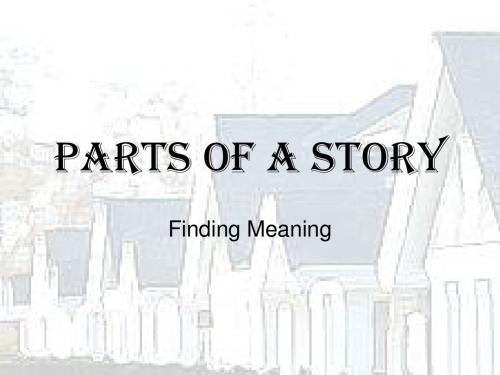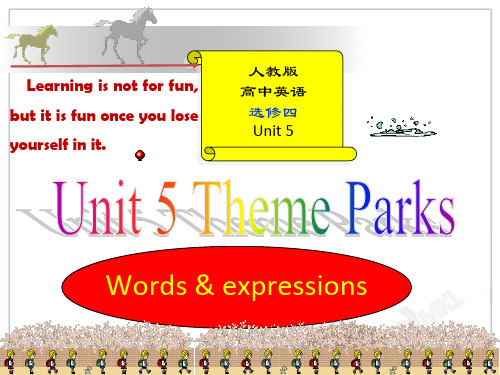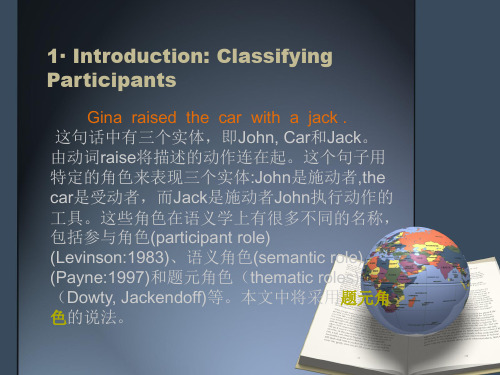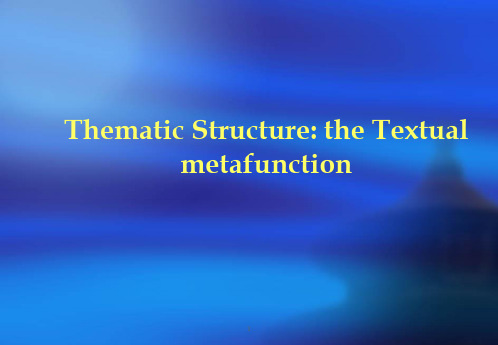Theme
- 格式:ppt
- 大小:888.50 KB
- 文档页数:54






main theme翻译main theme翻译是:主题曲;弘旨;主旋律双语例句:1.But the main theme of the speech seemed to be that this bill needed to be passed. 然而演讲的似乎主旨仍围绕着促使该法案获得通过。
2.She was the second Japanese composer whose work was appointed as a main theme song of a TV drama in Korea.她也成为第二名指定为韩国电视剧作曲的日本作曲家。
3.These two qualities will make it easy to provide examples, which is the main theme of this series.这两件事情会让你轻松地举出例子,这就是本系列的主题。
4.Cooperation is always of the main theme of bilateral relations despite of some challenges that need to be handled properly.两国间虽有一些需要妥善应对的挑战,但合作始终是主流。
5.Decide which points are being made that refer to this main theme. Write these down in note form under the main heading.确定哪几个要点与中心意思有关。
在标题下面以笔记的形式记录下来。
6.If I were to write this novel the main theme, or motif, would be buried, at first, and only slowly take over .如果我写这么一篇小说,就会在开头把主题隐藏起来,然后慢慢地展开。
(一)主位与述位:主位结构指的是主位(theme)和述位(rheme)的结合体。
最早提出主位和述位概念的是布拉格学派的马泰休斯。
早在语篇语言学形成之前,马泰休斯在二十世纪30年代就功能角度研究信息在句子中的分布,用信息论的观点,修改了“主语”和“谓语”的提法,提出“主位”和“述位”。
“主位”指的是已知事实或公认的事实,意为已知信息。
句子的其余部分是“述位”,它包含了要传达给听话人的全部信息,意为新信息。
主位的形式包括概念主位,语篇主位和交际主位。
(二)主位推进模式:捷克学者丹内什发展了布拉格学派的理论,从语篇的视角,研究连贯语篇中句子与句子之间其主位与述位的衔接、照应、过渡以及逻辑连贯的规律,提出了主位推进的概念。
丹内什把对句子结构进行描写的方法用于语篇分析,并断定:主位因其较低的现象价值而成为语篇重要的构建手段,对于标示语篇的统一性起着至关重要的作用。
主位在一个语篇内的顺序绝不是任意的,下文中出现的主位总是与上文中具有主位——述位结构的语言单位相关,因而表明,听者对语篇的内容有了进一步的了解。
一个篇章真的正主位结构是指主位的衔接和连接,它们的相互关系和领属层次,以及跟段落、整个语篇和情景的关系。
1韩礼德提出,主位是“the starting point for the message”(Halliday, 2000: 38),即信息的起始点;功能语法学者Thompson(2000 :119)也作出明确的定义,认为小句的第一个语法成分是主位(Theme),其余是述位(Rheme)。
我们用符号表示则是T表示主位,R表示述位,T1, R1分别表示第一句的主位和述位。
为了更好的了解主位与述位,以及主位推进模式在文章中的作用,我们来看接下来的这个例子。
He asked for music. He dictated his will. He wrote a long letter in Latin. He bade goodbye to his brother.”很明显,主位都是“he”。
看不见的日本人In this sort story, Greene creates the favorable image of a girl, who is not only attractive in looks but also firm in spirit. She has just had her first novel published, and now intoxicated by her success and inflated by the publisher’s praise, she wants to stake her future on a writer’s career. For such a girl, Greene expresses great sympathy and deep concern, himself being a veteran author who knows all the problems and sufferings of being a writer. While he seems to be worrying abut the particular girl, he offers all young would-be writers his reflections on being a writer and his advice to them on choosing other careers than writing.Greene seriously believes that writing requires enormous pains and is never an easy job.A writer may put forth “years of effort” but end up in “doing nothing well”. The girl obviously did not realize this when she set out to write. Beside, writing calls for extremely keen observation. The girl is certainly not up to the job, for she fails to notice even those Japanese gentlemen seated highly visibly in an English restaurant. The girl is sure to suffer if she really embarks on a career as a novelist. As an older person of about her mother’s a ge, Greene cannot bear to see her, whom he has affectionately portrayed in the story, suffer in her future life. He would like to advise her to take up some other job, because in his words, “she deserves better of life” then toiling as a professional scri bbler.The girl’s fiancé and the Japanese gentlemen have respective roles to play in the story. The man is described as weak in personality and as such, serves as a perfect foil for the girl’s strong character. In several places of the story, the author gives meticulously detailed descriptions of the Japanese gentlemen at the fish dinner. Although the girl is also mentioned as having looked at them on a number of occasions, her glances have never come to anything. In this way, the girl’s exaggerated po wers of observation are set well apart from a true writer’s watchfulness. The title of the story epitomizes this meaning.男女性格The girl has both the pretty looks and the strong character of the typical Regency girl, for she know clearly what she wants. The man, by contrast, has only Nelson’s look, but not his courage, foe he does not even have his own mid, always relying instead on what his mother or his uncle says. The girl was always on the offensive and the man could only use other s’ words to defend himself. He was weak in nature.环境描写The Bentley’s restaurant, then Roedean or Cheltenham Ladies’College, and Chablis, together wirh miniatures---all these cues, each with rich cultural connotations, work subtly to build up a picture of privileged young couple with a wealthy family background. Certain names, such as the names of certain places, restaurants, leading newspapers and periodicals, or brand names, can have connotative significance. They are used by writers of every language to create a backdrop, as atmosphere.她作品题目(title sounding hollow or profound, signifying the eternal cycle of life and death; her choice of words suggesting her naivety as well as ambition )(The original title might not sell the book well. The publishers would have a shrewd idea of what title fitted a book better.) Chelsea --- a fashionable district in west London, famous as a quarter where popular artists of a rather shallow talent, concerned mostly with fashion and popular music, gather and show off. (He’s very Chelsea. – he lives in a way which is less restricted than most people, taking no notice of conventional rules of behavior.)~~ Besides, “the ever-rolling stream” was an awkward collocation, for the usual collocations would be “ever-rolling waves” and “gurgling streams’. The new title “The Chelsea Set” was more alluring, and put the book into the right category where it belonged.。
剑二Theme C 的词汇解析1.detective 英文释义:a member of the police force or a private investigator whose function isto obtain information and evidence, as of offenses against the law.考点一:detective 既可以作名词,也可以作形容词。
detective adj. 侦察用的Eg. He likes to read detective stories.n. 侦探,私人侦探Eg. She hired a private detective.考点二:detective 的常用短语。
detective novel/ story 侦探小说detective agency 侦探所2. invention 英文释义:an act or instance of creating or producing by exercise of the imagination, especially in art, music, etc.考点一:invention, invent, inventor 的词形转换。
invent v. 发明,创造inventor n. 发明家Eg. Printing was invented by the Chinese inventor.(invention)考点二:invention 的用法Invention n. 发明,创造;捏造,虚构Eg. The story was pure invention.这个故事纯属虚构。
3.electronic 英文释义:An electronic device has transistors or silicon chips which control and change the electric current passing through the device考点一:electric, electrical, electronic 的词义辨析electric为“电的,用电的,带电的”,指任何电动的或发电的装置,被修饰的物体本身可带电。